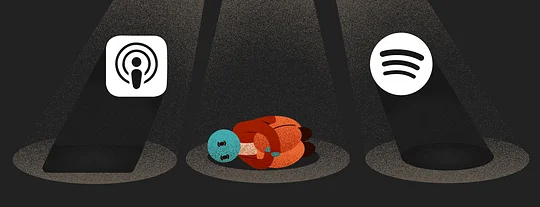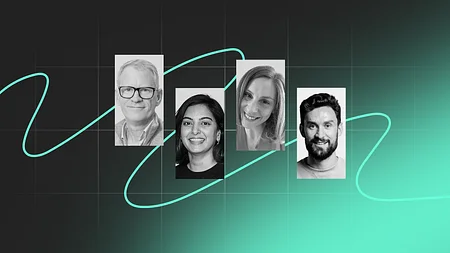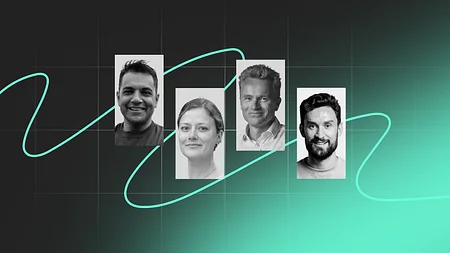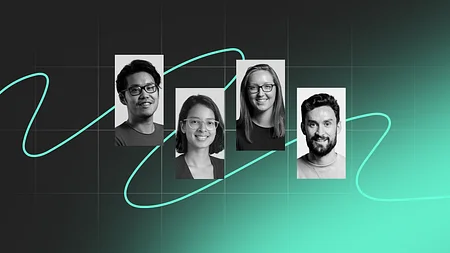Apple vs Spotify: who will own podcasting?

Recent news that Apple is talking to media companies about exclusive shows is another indication of how podcasts are maturing. Who will win? And what could it mean for creators and consumers?
Apple has been looking at services-related revenues, and the role of original content for a while. It’s seen Netflix, and Amazon to a lesser extent, steal a march on TV and Spotify challenge its home turf of music streaming. But when it comes to audio, things are less clear cut.
Until now, Apple has also been entirely neutral, allowing anyone to upload their podcast's RSS feed into its app and distribute through the platform. That looks like its about to change, with recent news from Bloomberg that Apple is looking to create (either develop or buy) Podcast app exclusive media properties.
Serious amounts of money are now being thrown at podcasts, in the belief there is still a large amount of untapped revenue up for grabs. The acquisition of Gimlet and Anchor by Spotify for almost half a billion dollars must have raised a few eyebrows over at Apple HQ, signalling that the competitive landscape is shifting pretty dramatically. Luminary, who recently raised funding have a model based entirely on exclusive content, through the likes of Trevor Noah, to encourage people to sign up for a monthly fee, a la Netflix.
Apple, however, still holds a major advantage for now: the numbers. The other platforms are having to play catch up.
To some extent, Apple basically invented podcasts by giving them the platform to exist. Its Podcasts app is the leading podcast platform, with anywhere between 50 to 70 percent of the app market, depending on the show.
Serious amounts of money are now being thrown at podcasts, in the belief there is still a large amount of untapped revenue up for grabs
But, it could be argued that today the creators are now king. The likes of Joe Rogan and Tim Ferris don’t really need anything more than a Squarespace website for millions to listen to their content, so the Luminary model may take a few years, and a few billion dollars, to really kick off.
It’s also going to take a while for people to be comfortable with paying for audio content. 10 years ago, it didn’t feel right to subscribe to Netflix, as you could buy DVDs. Now it’s the opposite.
There’s a friction there when asking people to purchase audio content, particularly content they've got comfortable being free and freely available but is bound to evolve. That’s where there’ll be huge winners. But these shifts will have an impact on consumer and creators.
Impact on consumers
Choice is a great thing right? Not always…
The great thing about podcasts—and I say this as both a listener and a creator of podcasts—is that it is, like the web, a free and open ecosystem for content. You can listen to any podcast in any podcast player.
If Apple creates podcasts that can only be listened to in Apple’s own app, we could see a scenario similar I find myself in trying to watch different European football leagues, where the content and rights are carved up across multiple services.
I have to pay one provider (sometimes two) for live Premier League games, another for La Liga, a third for Serie A. Another for select Champions League games. It gets expensive and it’s not a great user experience.
Apple, however, still holds a major advantage for now: the numbers
Streaming video is heading down on that road with Apple, Netflix, Amazon and soon Disney, HBO, ESPN...and it’s not killed much, yet. However certain shows are already being removed, certain studios aren’t releasing films as publishers know they will be a draw to bring subscribers to their new platform.
But audio is not video. A lot if it happens in the background: when people are driving, commuting to work, or as one of our Fintech Insider fans does, walking the dog on the beach. The current range of apps support this consumption with autoplay of the next episode, either of a specific show or a playlist.
Imagine having listened to one show you then having to switch apps to consume the next one because they’re platform exclusives. That’s one possible scenario in a world of platform exclusive shows.
Impact on creators
There’s also the potential impact on creators.
Now, at first the idea of Apple saying “take our money” to creators might seem attractive and I’m sure a lot of people will happily oblige. But there are risks.
If you make your content exclusive to one platform, even if today it is the leader, as part of a premium offering, you’re assuming people are willing to pay for what they were getting for free.
Most likely, premium content will revolve around either a) massive personalities with an established profile - think an Oprah or Shaq, or b) Apple will acquire media outlets or hire big shot production execs.
This will make the podcast industry increasingly saturated, meaning fewer and fewer small creators break out into anything close to mainstream. Show numbers, and potential revenue, could be reduced.
We’ve seen how a lot of traditional media properties, primarily newspapers, initially struggled to adjust to moving behind a paywall. It’s also just harder to acquire new listeners if your podcast is behind a paywall.
Plenty of people stumble across a lot of interesting content by accident because it’s freely available and then subscribe. Adding a payment layer to that reduces that findability.
The great thing about podcasts is that it is a free and open ecosystem for content
Impact on podcast industry
There are multiple ways Apple might approach a new podcast strategy. Apple move when it’s right for them and when the $$$ upside is huge, so I can see some Gimlet- level investments soon.
We might see a mix of free-to-air and paywalled content from the biggest shows, giving Apple exclusive content but not putting all of the creator’s content entirely behind the paywall. Think how a lot of news sites will often give you “5 free stories”, or similar, a month.
However, we can’t underestimate just how much of the industry is creator, not publisher, driven. It’s not like YouTube where a change in an algorithm can see you go from 10k views to 1k views on a weekly basis. It’s not music where there are multiple labels and publishers owning back catalogues to contend with.
If, for example, Apple suggested the Joe Rogan Experience should go behind a paywall, I think he’d move to another provider, or go it alone, take his audience with him and continue to monetise it in the way he chooses.
Podcast audiences are super sticky, which is why it'll take a long time for Apple/Spotify to create things that truly acquire and retain significant amounts of users who are only there to listen to said premium content.
I signed up for Netflix just to watch Breaking Bad. That was it. They still get my monthly subscription payment. That’s the type of calibre of content that Apple and Spotfy need to create, which will almost certainly centre around huge personalities.
Regardless of the exact model, it is a definite change in strategy for Apple. With its reach - and money to invest - it could fundamentally shift the entire podcast industry.


